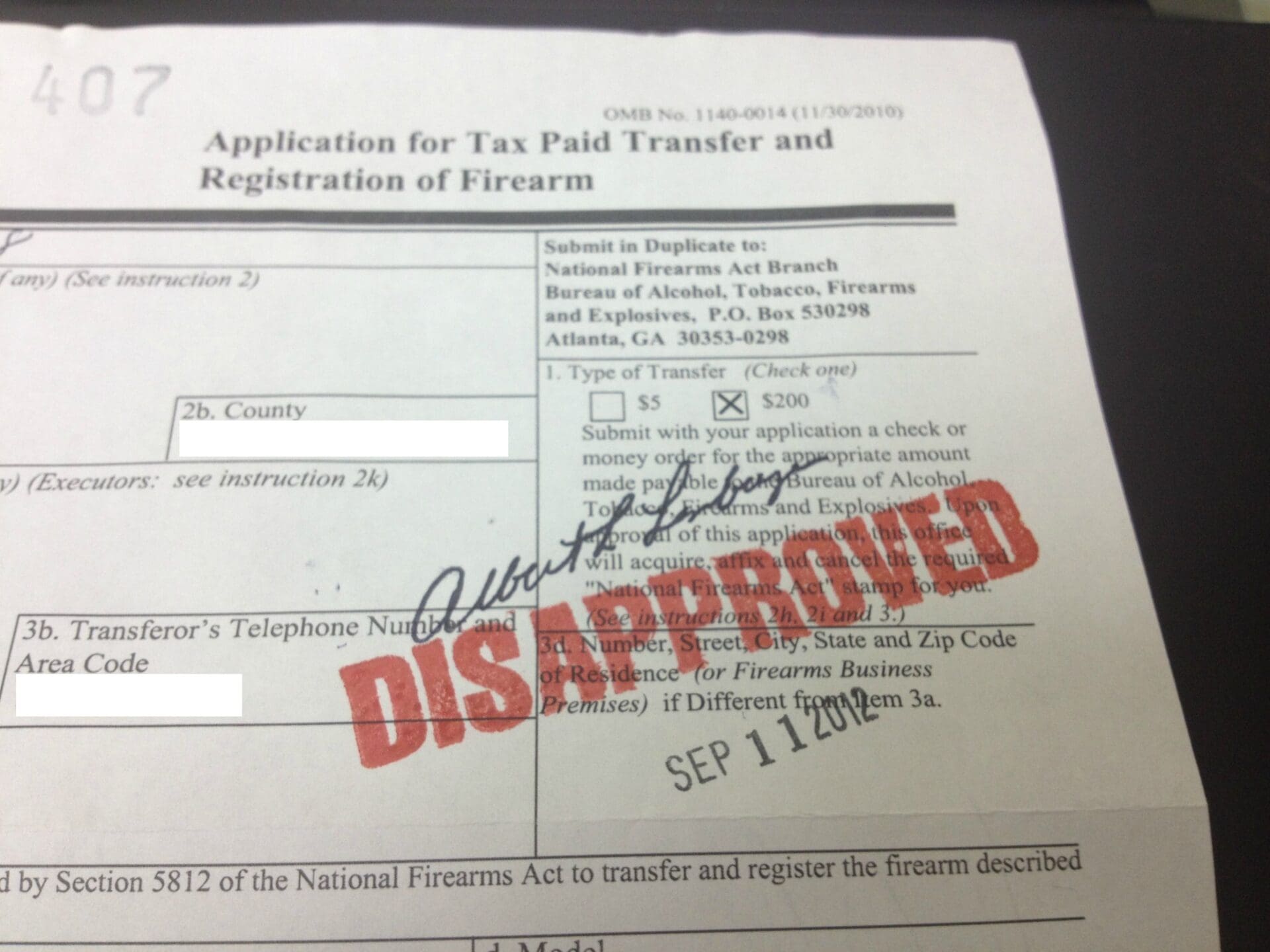As many of you know, I am a vocal critic of our legal community when they get it wrong and since turnabout is fair play, I’m going to talk about one of the few times where the system gets it right and everyone can smile and nod in quiet acquiescence. I got a call this morning from a local attorney who is a board certified expert in criminal matters and has a client that is about to be a convicted felon . . .
Since Baton Rouge is one of those towns where if you hang around long enough you get to know all the players, I knew this attorney by reputation as one of the more competent and better practitioners in the area. The call was about a client who had a gun collection that was confiscated by the police as non-relevant evidence in a criminal matter. The firearms were returned, but with once the case had been decided, there would be an issue of legal disposition. Namely, how do you keep the gun collection as a convicted felon? The short answer: you don’t.
Counsel’s advice to the client was to get rid of all the guns in the collection. The client’s family was, for the most part, a bunch of non gun-owning folks who would have no idea what to do with it all or potentially injure themselves. The attorney wanted to put together a few ideas to comply with the law.
Believe it or not, many bar associations have rules of conduct that govern ethics and practice. In my state there’s a rule concerning the competency of legal advice. In a nutshell, it states that if you aren’t competent to advise on a particular matter, know when to throw in the towel and ask for help. That’s why my phone rang.
With no idea as to present valuations and the technical details about this cornucopia of ballistic perforation equipment, I was brought in as the pro from Dover. Narcissism notwithstanding, this attorney knew when to ask for help from someone who knew the subject matter at hand. Since this was something outside their area of knowledge, it’s refreshing to see someone actually admit what they didn’t know.
Our legal community would be far better served if instead of pontificating on a subject with which they have limited knowledge, more attorneys would press the pause button and get up to speed by talking to people who know the given subject matter.
After reviewing all the information presented to me in the form of a police department inventory report, I gave some numbers as to what the soon-to-be convict is looking at by selling everything via private sales, what dealers would offer, and the value in selling certain firearms one method over others. I was also asked a few other questions on state firearm law on other cases and I presented several obscure statutes that did not immediately come to mind, but were clearly relevant to firearm-related criminal defenses.
Sidenote: The Form 4 that the client filed for an NFA device was disapproved due to pending felony level charges. In this case, the ATF did their job by meeting the requirements of GCA-68 and denying a sale. This raises one really good question: if you are an existing owner of NFA-regulated gear and you become a convicted felon, how does one dispose of the guns in question? As NFA-regulated items carry strict liability — there is no “Oh I’ll just be leaving it with a family member” as that only creates another NFA violation. Nor is there a clear legal strategy to facilitate legal disposition to another party prior to a conviction. Something to think about.
Regrettably, an attorney who asked for assistance in an area where they needed it is an outlier rather than business as usual. We went on to discuss the fact that it’s entirely possible in our legal system to be a firearm owner, engaging in lawful activity who gets arrested and is unable to get the application of the relevant gun laws correct. Many laws just happen to be passed by a legislature that doesn’t understand gun technology or firearm concepts. It is then possible to be hauled in front of a judge who doesn’t understand gun laws or gun technology either, all while being defended and prosecuted by attorneys with the same limited understanding. What a country!
Coincidentally, this particular attorney will be taking to the bench in a few months to replace a retiring judge in my area and I was thoroughly impressed with the willingness and ability to ask for help and to keep an open mind, especially when it comes to technical matters like firearm laws and defensive gun uses. I think this should be a tenet of any good jurist and when asked, I considered it my civic duty to give a crash course to the future judge on gun terms. I wish that the legal community as a whole shared a greater interest in learning about subjects they do not know.
This article starts off about how I’m impressed by the fact that someone in our legal community and soon to be part of our legal system knew when to ask for help. However, it also underscores just how real the real threat of ignorance is in our system. What would this case have looked like had I not been consulted? This was a simple one – and there are not too many simple cases anymore.
Every gun owner should have a thorough knowledge of firearm law, defensive and legal uses. With great power comes great responsibility. Part of that responsibility of having access to an attorney that can competently represent you in the event you run into the cop who is convinced they are right and that you are wrong. I encourage anyone who takes their rights as a citizen seriously to do their homework and have an attorney who knows how to get it right for just these occasions.





It would suck, but are you legally allowed to just destroy your NFA items in such a case?
A dealer could purchase them from you but, yes, you could destroy them. NFA items do get lost, stolen, or destroyed. It happens. You can’t criminalize that.
I am still waiting on some family members to get my trust notarized and start on my own NFA adventure, but from reading silencertalk I think you have to file some kind of form with the ATF if you’re going to destroy an item.
Trust?
I would think having a trust for just NFA items could solve the issue of own-turned-felon. It could be treated as if you died and the trust would become the beneficiaries. Just idle speculation.
If its an SBR you could at least sell the upper to someone with a pistol since that s like 80% of the cost of an AR, then take the grip/ trigger guard etc off and just trash the lower. That way at least you would lose as little cash as possible.
No idea for a silencer or any other NFA stuff. That would royally suck though.
The poster asks “if you are an existing owner of NFA-regulated gear and you become a convicted felon, how does one dispose of the guns in question?” This concern is one of the many reasons a trust should be used for NFA firearms. A trust specifically designed for NFA firearms could deal with such contingencies.
Or, you could just not let people cook 9 pounds of meth in your house. That’s also a viable alternative.
I draw the line at 8.
Solving problems one at a time!
I nearly spit my cereal on the keyboard.
Just a small town lawyer, gun owner and hunter here looking into the subject. I have been asked a few times about these trusts, so I am looking into the reasons for their existence and their legitimate usefulness by reading whatever I can find on the subject. I don’t mean to give particular weight to the statements made by attorneys, but I thought one interesting point on this thread started with the one attorney, Mr. Bergstrom, pointing out that a trust might help to deal with the issue of an owner becoming disqualified to own. That seemed to be scoffed at, maybe just in general fun, but it made sense to me. The next attorney, in response to George M’s plight with his deceased father’s weapons being in limbo, described a process that included involving a class III dealer, getting a judge to enter an order, and firing off forms (and of course this involved hiring the attorney to get this done) to fix the problem of disqualification. One thing I have seen in my practice over the years is that getting a judge to sign an order is not always easy, regardless of how good your law is. Though a trust would be an expense, it looks like a trust containing language that automatically excluded a trustee or beneficiary who became legally disqualified to own such firearms would have been a nice thing for George M’s dad to have had.
these arms/tools are locked up since the 90’s and every time i see an officer i know that knew my dad they always say how nice his guns are. i was puzzled, long story short my dad was not a good standing citizen he was busted for dealing i was only 12 years old at the time, he had my mother buy the guns in her name. she was the real owner she was dragged into this because she was in fear of him, i feared him.. but we had our good days and more bad days. her lawyer was Terence L. Kindlon, in this area hes a big time lawyer and would not go after the rifles she wanted to sell to make up for the loss of being marred to this man of 30+ horrible years.they were in her name and she suffered no felony, me i have no felons either. i want to have them to keep and use with my sons as there raised in a much better environment than i was. i tell ya living in those days was the reason my sons are good kids, good grades, great behavior, never a call from their school, don’t run around and get inn trouble i could not be more blessed.. it just kills me because i know after my mothers 6 month ACOD she could of got them back.. i want them back… some are worth big bucks. all original M-1 garand,M-1 carbine, a shot gun from the 50’s few lever actions, all older guns.. i live in N.Y. and ill tell ya the laws here are horrible.. yes i attend all rally’s for this signed in the middle of the night on Saturday NY SAFE ACT criminal law.. i really appreciate your feedback ladies and gentlemen!!
“many bar associations have rules of conduct that govern ethics and practice.” Many being the operative word?
All. Every state.
Do they matter?
“The Connecticut Law Tribune reports that Mayo was reinstated to the bar in 2007 after a 15-month suspension for allegedly making unwanted sexual advances toward female clients. A judge in 2010 banned him from representing women in domestic violence and family cases.
Mayo agreed in July to a four-month suspension and a lifetime ban on representing women in any type of case, after admitting to representing at least 11 women since 2010.”
In several instances he forced his clients to give him BJ’s in order to go forward with the cases. He is still practicing. Tell me, what is the point of the Bar Associations? In another case there is a lawyer in CT who stole $4 million from a client he was representing in probate, is was not disbarred, and was given 12 months in jail. That is all.
If the legal system does not get rid of corrupt judges, criminal lawyers and corrupt cops but simply perpetuates the problems with slaps on the wrist, what is the point? All they do to someone is wave a condescending finger and say “bad boy, don’t do that again!”
It is unwise to cherry pick cases, as they are not necessarily representative of the whole. In California, an attorney can be suspended for a first DUI, and disbarred for more than one. Same for drug use, any felony conviction, stealing from clients, etc. And they regularly are suspended or disbarred. But it is like anything else; simply because you broke a law does not mean you automatically get the death penalty.
Tell me, what is the point of the Bar Associations? To fund raise and organize for libtard progressive political candidates.
EBOLA in America – Brought to you by Barack Hussein Obama and the Democrat Party.
And I’ve seen innocent lawyers railroaded and their licenses taken because they stood up to corrupt cops and prosecutors. What’s your point ? No system is perfect.
The monthly state bar magazine next to me has 14 lawyers disciplined ; from public reprimands to suspensions to three disbarments. A similar number of disciplinaries are listed each month. That tells me that lawyers, as a profession are concerned about honesty in their service to clients. Per capita, far more lawyers are disciplined than doctors (and doctors bury a lot of their mistakes). Yet, I don’t think doctors are dishonest as a profession.
Don’t get me wrong. I think you’d find few lawyers or non-lawyers more skeptical of the profession than I. But we do try to to get rid of the worst ones.
“…confiscated by the police as non-relevant evidence in a criminal matter…”
What the he!! is non-relevant evidence? Sounds like an oxymoron to me.
Could be a vocabulary issue, if I have to take a gun for safekeeping or as found property, it gets booked into evidence. Technically, it would be called an item of evidence, but the record for the item would note a different use code than evidence for a criminal case.
We rarely do this, I’m three for three in convincing people who bring guns to the station for disposal (to placate an angry wife, usually) that everyone would be better served by selling them to a gun store so they don’t get destroyed.
If one of te items ins NFA, how do you ge it back in a timely fashion witout having to pay (again) and have to wait for approval (again)? As I understand it, checks have to be done on eligibilit for returned firearms.
My understanding is that the government (used here in the sense of police, prosecutors, etc.) have the right to seize items that may or may not be directly listed on a warrant even if it is not immediately clear that they are relevant to a given case, as it may have relevance at a later date. I am not sure what the limits on that are, so if one of the various attorneys on the site would like to chime in, that would be helpful. There was a recent second circuit court case that stated that the government’s right to “over-seize” is a temporary one, and that they cannot hold that evidence indefinitely. The particular case was in reference to files and hard disk images, but I would imagine the principle would be the same for physical evidence.
That caught my eye as well. I guess it is one of those nonsensical phrases that get thought up by bureaucrats.
I have never understood why, when police search a property, even for nonfirearms related issues, they ALWAYS take the guns for “safekeeping.” And then they make you prove that you are the true owner, even if it is an unregistered firearm that you inherited from a long dead relative.
That’s exactly what I said.
The state had stated that anyone with that many guns was up to something criminal. The defense made a motion to return property and the judge ruled that the firearms were not material to the case at hand, so they were taken as evidence but then ruled not material.
It sure is refreshing to hear that an attorney does not have a god-complex. About a half-century ago when I graduated high school, I thought I knew everything. After my undergraduate degree, I thought I knew some things, after many more years of school and several more papers on the wall, and decades more experience, I know more of what I do not know and how (and in whom) to find the answers than I ever did before.
That is why i seek professionals, whenever and wherever possible. Presently, in the midst of a remodel of a large old home, I am surrounded by professional plumbers, electricians, HVAC, roofers, concrete finishers, and many others including my wife who is our “professional” interior decorator, and the final word on all things pertaining to the home. (I have not been married these many decades without learning something!) I never shop at Home Depot any longer since they have young people, and not many of them either, who know less about just about everything than I do. I do shop at Lowe’s where in every department they have at least one professional who I can consult before I make a fool of myself.
Ah yes… but “felon” applies to so many things that should not ever be considered a “crime” to start with. No victim, no crime. How is it that someone who has merely come to the unfavorable attention of those who enforce every sort of insane prohibition should permanetly lose their guns, and therefore be relatively helpless to defend themselves and their loved ones against actual violent criminals?
I’m glad the lawyer and future judge has enough intelligence and integrity to ask. But it’s not good enough… not by a long stretch.
Anyone who truly can’t be trusted with a gun (or any other tool) needs to be in a cage, in the charge of a guardian, or dead at the hands of their intended victim.
hello, my dad long passed away had his arms taken because simply he was an idiot.”sorry day” but they are still sitting in the station not destroyed probably rusted to death but not destroyed i want them so bad.. how can i get them back without spending tons of money
Put out some feelers in your area for a lawyer that can do some pro bono work. Realize with free legal advice, you may well get what you pay for.
I’m working on it..thank you for your reply do you really think i need a lawyer?.. i mean I’m no felon and they were my dads rifles.. yes he messed up and has been dead for a long time i just want what is mine.. i remember my first time shooting with him. chip monk .22 i loved that rifle..
I’ve dealt with the “what if you are arrested/convicted of a felony” question with clients before. The direction I got from the NFA branch was to find your local Class III dealer, arrange for them to hold on to the NFA items while the case is pending, then go in front of the Judge presiding over the case and have the judge order the defendant to relinquish the NFA items to the Class III dealer. Then immediately fire off a Form 5 asking for a tax exempt transfer for the purpose of “safekeeping during pending criminal case, 14CR12345” and attach the Judge’s order. The class III can hold onto the NFA device until the case is resoled and the item is returned or Form 4 clears to sell. And the branch told me that as long as there is a court order for the relinquishment to the dealer, that they aren’t going to come down on the dealer for having it until the form 5 clears.
Great advice. Few issues.
1. No such thing as a Class III Dealer.
2. The scenario you are describing is textbook unregistered possession.
FC- I’m confused by your statement “no such thing as a Class III Dealer.” I’m quite confident that a Type 1, Class 3 FFL is a real thing (Dealer or gunsmith in firearms other than destructive devices, dealer in NFA firearms).
And yes, that scenario is textbook unregistered possession, but here in Colorado we have a stupid law that says if you are arrested (not convicted) for domestic violence, then you have to relinquish all your firearms to 1) The police, 2) An FFL, 3) complete a private sale through an FFL with an ATF 4473 to a private party. And the law says you have to do all this before you can be released on bond (though most courts in the state will give you 72 hours after you bond out to provide proof to the court). I wrote the NFA branch a letter in June of last year, asking how exactly someone with an NFA firearm is supposed to comply with this law, and received a phone call (I wanted a letter, but government…) from a higher-up at the NFA branch describing this exact process.
Attorneys are only good if they ask the Firearms Concierge for help.
Only the Firearms Concierge can understand firearms laws.
Or. . .
The lawyer was skirting malpractice by offering a store clerk as an expert witness in a court of law.
I’d bet on the latter.
Apparently the only good lawyer is a lawyer that appropriately sucks up to FC.
Do you see anyone here named Firearms Concierge?
I don’t.
“Our legal community would be far better served if instead of pontificating on a subject with which they have limited knowledge, more attorneys would press the pause button and get up to speed by talking to people who know the given subject matter.”
Congress would only be in session for about fifteen minutes at that rate. I like it!
Pro from Dover. Wassup Trapper John?
Would these firearms happen to have a Red Jacket logo ont them?
no they do not.. nor would i buy one.. ill bet you would guess why.. Will Hayden is still in jail….
“Our legal community would be far better served if instead of pontificating on a subject with which they have limited knowledge, more attorneys would press the pause button and get up to speed by talking to people who know the given subject matter.”
Oh, please. Lawyers do this all the time. There is literally an entire industry of subject matter experts that testify in litigation about highly technical subjects. This blog would be better served if they wouldn’t let Firearms Concierge constantly pontificate about his dislike of lawyers.
Dislike of lawyers?
I thought it was a dislike of everyone and everything.
i dislike having to explain myself to a judge for somthing that belongs to me..
Comments are closed.